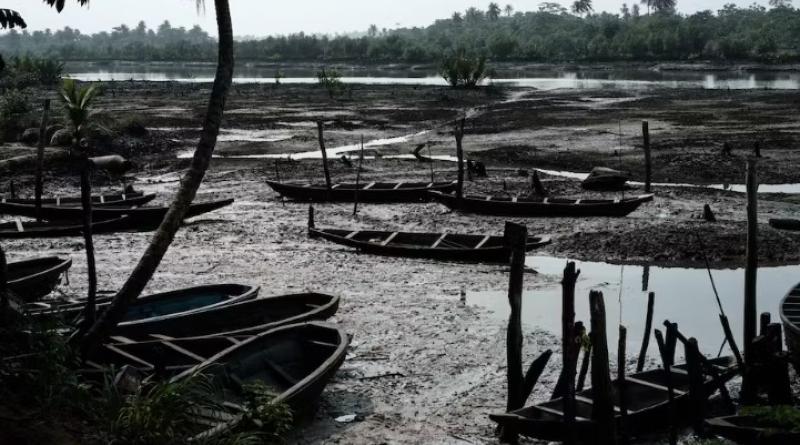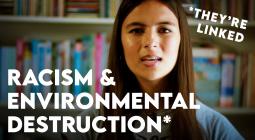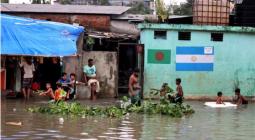Niger delta is rich in resources, but environmental destruction is pushing people into poverty

Nigeria’s Niger Delta region is rich in natural resources. Its vast oil and gas deposits are the mainstay of the country’s economy.
The region, in the southernmost part of the country, features coastal barrier islands, mangroves, freshwater swamp forests and lowland rain forests. The coast offers various ways of making a living, like fishing, tourism, producing salt, and farming coconut and bananas.
Yet it is estimated that over 47% of the population in the region lives below the poverty line.
We study the economic aspects of environmental issues, and in a recent paper set out to understand the relationship between the destruction of coastal ecosystems in this region and the economic hardship the people faced.
We found that marine ecosystems had been badly affected by a number of factors, including an increasing population, pollution, over-fishing, damaging fishing techniques and global warming.
The degradation of the environment affects the poor the most as they depend on natural resources like seafood and wood for survival and energy. And they do not earn enough to relocate from polluted areas.
The destruction of an ecosystem
We identified a few areas where the Niger Delta ecosystem had been badly affected. The environmental problems in communities like Bille, Andoni, Okirika, Emohua and Ibaa in Rivers State are caused by oil spills, gas flaring, human activities and water pollution, among others.
Between 1976 and 2006, there were at least 7,000 oil spills in the region, affecting an area of more than 2,500 square kilometres. These oil spills have polluted the soil, water and air, and they have had a devastating impact on the people who live in the region. The destruction of the ecosystem has led to environmental problems like flooding and soil erosion, which destroys homes and crops, leading to further poverty. The lack of a healthy ecosystem has led to health problems for the people living in the region.
Gas flaring is the process of burning off excess natural gas that is produced during oil drilling. More than 2.5 billion cubic feet of natural gas are flared every day in the Niger Delta. This process emits greenhouse gases and other pollutants into the atmosphere, and it also wastes a valuable resource that could be used to generate electricity or heat homes.
Mangroves are being lost because of water pollution. Mangrove forests are an important source of food and income for local communities, and their loss has led to a decline in fish stocks and other marine resources. This has damaged the livelihoods of fishers and increased the price of fish in local markets.
The environmental consequences of the destruction of mangroves include erosion and increased vulnerability to storms and flooding.
Natural resources such as nutrient-rich soil, water, trees and fossil fuels abound in marine ecosystems. Excessive exploitation of these resources through mining, logging and oil drilling has had a negative impact.
Animals in an ecosystem keep the food chain in balance. Due to overfishing and hunting, many animals are disappearing from the Niger Delta. Manatees, sea turtles, dolphins, monkeys, antelope and others are under threat.
The destruction of the ecosystem in the Niger Delta has led to a cycle of poverty:
-
depletion of resources means people can’t make a living
-
environmental problems like flooding and soil erosion destroy homes and crops
-
human health depends on a healthy ecosystem.
There is evidence that destruction of the ecosystem has led to poverty in the Niger Delta region. Increasing soil sterility and diminishing agricultural output have forced farmers to move or seek illicit sources of living. The degradation of traditional fishing grounds has worsened hunger and poverty in fishing communities.
Protecting and restoring ecosystems
The impact of environmental degradation will only worsen if nothing is done to protect and restore degraded ecosystems.
In our paper we made the following suggestions.
-
Regulate human activities: Fishing and hunting in the region should be controlled to prevent the depletion of fish and wildlife. Industrial activities, such as oil drilling and shipping, should also be regulated to prevent further pollution of the air, water and soil.
-
Restore degraded ecosystems: Mangrove forests can be replanted in areas where they have been destroyed. Another example is restoring wildlife populations through captive breeding programmes and releasing animals back into their natural habitats.
-
Build the capacity of local communities to manage their natural resources: This is essential for the long-term protection of the region. One example is providing training to community members on sustainable fishing and hunting practices. Another example is giving local communities a say in how their natural resources are managed.
-
Establish marine protected areas: This would help to conserve marine life and ensure that coastal communities can continue to benefit from the resources they depend on. One example is the Calabar-Oron Marine Protected Area in Cross River and Akwa Ibom states. It is home to a variety of marine life, including dolphins, turtles and whales. The area is used for sustainable fishing, ecotourism and research.
We also recommend steps to address the root causes of poverty and inequality.
-
Provide access to quality education and healthcare: Education can help to create greater awareness about environmental issues, and lead to economic opportunities. Availability of these social services could reduce the appeal of rebel groups that promise economic and social benefits.
-
Address marginalisation: Groups like women and ethnic minorities can be given equal access to resources and opportunities through inclusive decision-making at the local, state and national levels. Development programmes should target their specific needs.
Finally, renewed efforts should be made to address conflict and insecurity in the Niger Delta by strengthening governance and the rule of law. Improved governance can lead to stronger enforcement of environmental laws and regulations, which can protect ecosystems from further degradation. In addition, it can protect land rights and create a more stable environment that offers economic opportunities.





